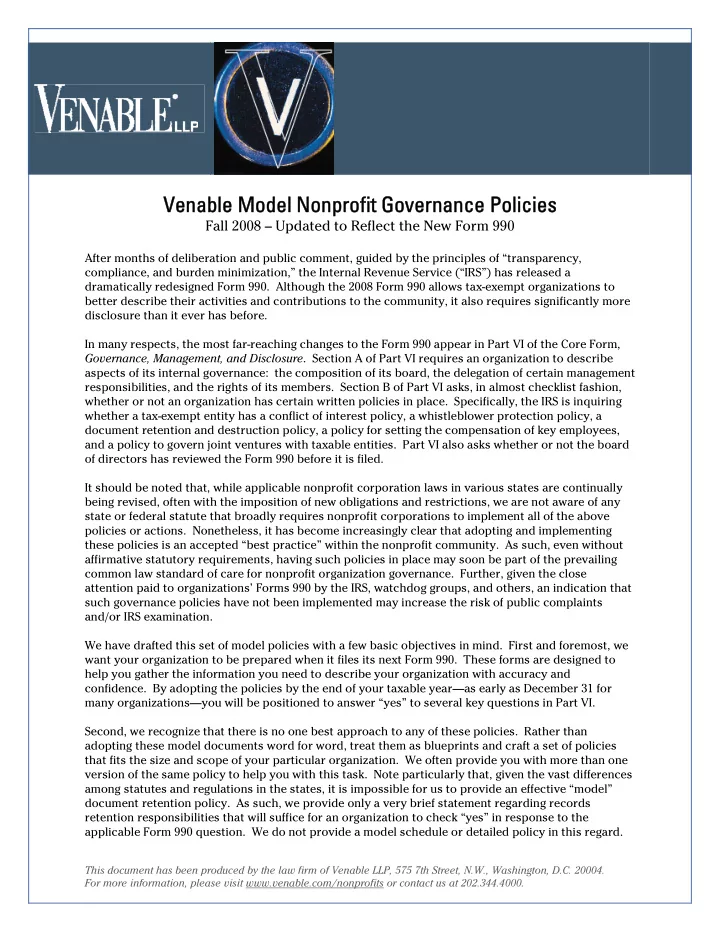

Venable Model Nonprofit Governance Policies Venable Model Nonprofit Governance Policies Fall 2008 – Updated to Reflect the New Form 990 After months of deliberation and public comment, guided by the principles of “transparency, compliance, and burden minimization,” the Internal Revenue Service (“IRS”) has released a dramatically redesigned Form 990. Although the 2008 Form 990 allows tax-exempt organizations to better describe their activities and contributions to the community, it also requires significantly more disclosure than it ever has before. In many respects, the most far-reaching changes to the Form 990 appear in Part VI of the Core Form, Governance, Management, and Disclosure . Section A of Part VI requires an organization to describe aspects of its internal governance: the composition of its board, the delegation of certain management responsibilities, and the rights of its members. Section B of Part VI asks, in almost checklist fashion, whether or not an organization has certain written policies in place. Specifically, the IRS is inquiring whether a tax-exempt entity has a conflict of interest policy, a whistleblower protection policy, a document retention and destruction policy, a policy for setting the compensation of key employees, and a policy to govern joint ventures with taxable entities. Part VI also asks whether or not the board of directors has reviewed the Form 990 before it is filed. It should be noted that, while applicable nonprofit corporation laws in various states are continually being revised, often with the imposition of new obligations and restrictions, we are not aware of any state or federal statute that broadly requires nonprofit corporations to implement all of the above policies or actions. Nonetheless, it has become increasingly clear that adopting and implementing these policies is an accepted “best practice” within the nonprofit community. As such, even without affirmative statutory requirements, having such policies in place may soon be part of the prevailing common law standard of care for nonprofit organization governance. Further, given the close attention paid to organizations’ Forms 990 by the IRS, watchdog groups, and others, an indication that such governance policies have not been implemented may increase the risk of public complaints and/or IRS examination. We have drafted this set of model policies with a few basic objectives in mind. First and foremost, we want your organization to be prepared when it files its next Form 990. These forms are designed to help you gather the information you need to describe your organization with accuracy and confidence. By adopting the policies by the end of your taxable year—as early as December 31 for many organizations—you will be positioned to answer “yes” to several key questions in Part VI. Second, we recognize that there is no one best approach to any of these policies. Rather than adopting these model documents word for word, treat them as blueprints and craft a set of policies that fits the size and scope of your particular organization. We often provide you with more than one version of the same policy to help you with this task. Note particularly that, given the vast differences among statutes and regulations in the states, it is impossible for us to provide an effective “model” document retention policy. As such, we provide only a very brief statement regarding records retention responsibilities that will suffice for an organization to check “yes” in response to the applicable Form 990 question. We do not provide a model schedule or detailed policy in this regard. This document has been produced by the law firm of Venable LLP, 575 7th Street, N.W., Washington, D.C. 20004. For more information, please visit www.venable.com/nonprofits or contact us at 202.344.4000.
Note also that some of the attached policies may refer to an executive committee or an audit committee. We recognize that many nonprofit organizations may not have such committees, and the policies provided would need to be revised accordingly in such situations. Finally, we hope that these documents lay the groundwork for year-round practices that strengthen and protect your organization well beyond the scope of annual reporting requirements. Simply adopting these policies as you find them may satisfy the narrow goal of being able to check the “yes” box on the IRS Form 990, but that alone affords little security in the long run. In fact, failure to enforce a written policy may cause your organization to be worse off than had it never adopted the policy at all. Use this period of adjustment to the new Form 990 to your advantage. Implement new policies to encourage candor and transparency, and revisit old policies that may prevent your organization from putting its best face forward. Good governance need not be overly burdensome or complicated, but it does take some thought. As always, please let us at Venable know how we may be of assistance. * * * Disclaimer This model policy, form or agreement is published by the law firm of Venable LLP, 575 7th Street, N.W., Washington, D.C. 20004. It is a sample only, is not specific to the facts of any organization, and therefore should not be used or relied upon without the advice of retained legal counsel. This policy is not intended to provide legal advice or opinion; such advice may only be given when related to specific fact situations that Venable has accepted an engagement as counsel to address. For more information, please visit www.venable.com/nonprofits or contact us at 202.344.4000. - 2 -
Recommend
More recommend